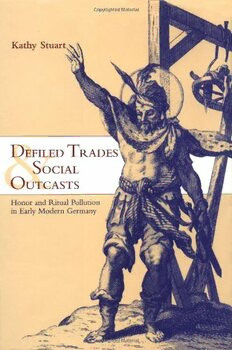
Defiled Trades and Social Outcasts: Honor and Ritual Pollution in Early Modern Germany PDF
301 Pages·2000·3.645 MB·English
Most books are stored in the elastic cloud where traffic is expensive. For this reason, we have a limit on daily download.
Preview Defiled Trades and Social Outcasts: Honor and Ritual Pollution in Early Modern Germany
Description:
This book presents a social and cultural history of "dishonorable people" (unehrliche Leute), an outcast group in early modern Germany. Executioners, skinners, grave-diggers, shepherds, barber-surgeons, millers, linen-weavers, sow-gelders, latrine-cleaners, and bailiffs were among the "dishonorable" by virtue of their trades. It shows the extent to which dishonor determined the life chances and self-identity of these people. Taking Augsburg as a prime example, it investigates how honorable estates interacted with dishonorable people, and shows how the pollution anxieties of early modern Germans structured social and political relations within honorable society.
See more
The list of books you might like
Most books are stored in the elastic cloud where traffic is expensive. For this reason, we have a limit on daily download.
